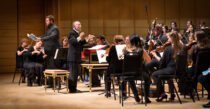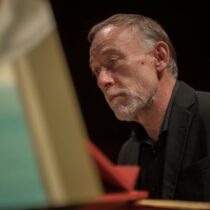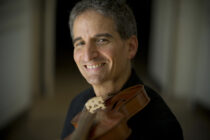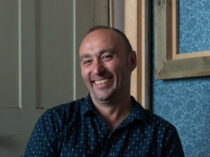Chan Centre for the Performing Arts
Subscriptions: To purchase tickets to this performance as part of a subscription to 3 or more concerts and receive a 25% discount off the full ticket price, please call Early Music Vancouver’s box office at 604-732-1610 or email boxoffice@earlymusic.bc.
Artists: Pacific Baroque Orchestra, Alexander Weimann, music director; David Greenberg, violin; David McGuinness, keyboard; Fiona Tinwei Lam, Vancouver poet laureate
Join Vancouver’s new Poet Laureate, Fiona T. Lam, EMV’s Artists-in-Residence, and the Pacific Baroque Orchestra in a musical celebration of water.
The Pacific Baroque Orchestra will perform Handel’s Water Music – a suite of highly spirited dance pieces for a small orchestra. Originally intended for outdoor performance, the work premiered on a barge on the river Thames, where it provided entertainment for a royal cruise hosted by King George I of Great Britain on July 17, 1717. The king was so delighted with the new work that he asked to hear it over and over—for a total of four performances. Telemann’s water music, Hamburger Ebb’ und Fluth, celebrated the centennial anniversary of the Hamburg Admiralty in 1723. The suite draws upon Hamburg’s geographical location as an important and successful port on the river Elbe. Telemann illustrates the piece with mythological water deities and tone painting. Alasdair MacLean is a Canadian composer living in Nova Scotia. His piece for five strings, The Silken Water is Weaving and Weaving, was inspired by a line from the poem Cape Breton by Pulitzer Prize winner Elizabeth Bishop (1911-1976).
Pre-concert talk: Join us at 6:45 p.m. at the Royal Bank Cinema for a pre-concert interview with Bill Richardson, Fiona T. Lam, Celia Brauer of the False Creek Watershed Society, and author Bruce Macdonald. This talk is included in the live concert ticket price.
The False Creek Watershed Society was created after Brauer’s growing interest in the lost streams of Vancouver. In collaboration with Macdonald, she created a map of Vancouver’s original ecosystem, drawing on documents from the nineteenth century.
“To understand what was here and really embody it, is a supreme act of reconciliation. Because only then can you imagine the world in which local First Nations lived. And then picture what was lost. And what that must have been like for these folks to watch their world be clearcut and paved over. It truly was – for a very long time – the richest place on earth. We cannot bring this back, but if we remember it honestly, we can perhaps bring parts of it back and certainly hold it in ourselves in spirit and cherish it.”
Celia Brauer
This concert is generously supported by Zelie & Vincent Tan, Helen & Frank Elfert, and Mark De Silva.
PURCHASING TICKETS
Click here to purchase tickets.
Subscriptions: To purchase tickets to this performance as part of a subscription to 3 or more concerts and receive a 25% discount off the full ticket price, please call Early Music Vancouver’s box office at 604-732-1610 or email boxoffice@earlymusic.bc.
PROGRAMME
Land acknowledgement
Xwechtaal Dennis Joseph
PROLOGUE
William Christie (c.1778-1849)
Pearlin Peggie’s Bonny (the Laird of Foveran) / The Kail Reets of Fittie / The Warld’s gane o’er me now
MacKinnon’s Brook (traditional Cape Breton strathspey)
Loch Ness (Scottish trad reel from Robert Bremner, A Collection of Scots Reels, c. 1751, CB setting)
Cronan na Linne Mhuilich [Cronan of the Sound of Mull] (Scottish trad reel from the Athole Collection, 1884, CB setting)
Over the Isles to America (Scottish trad reel from the Skye Collection, 1887, CB setting)
At the fishhouses – Elizabeth Bishop (excerpt)
Read by Fiona T. Lam
Alasdair MacLean (b. 1955)
The Elizabeth Bishop Suite
1. The silken water is weaving and weaving
ACT I
Lovers on Aran – Seamus Heaney
Read by Fiona T. Lam
Georg Philipp Telemann (1681-1767)
Hamburger Ebb und Fluht, TWV 55:C3
Ouverture
Sarabande ‘Die schlafende Thetis’ | The sleeping Thetis
Bourrée ‘Die erwachende Thetis’ | The awakening Thetis
Loure ‘Der verliebte Neptunus’ | Neptune in Love
Gavotte ‘Die spielenden Najaden’ | The playing Naiads
Harlequinade ‘Der scherzende Tritonus’ | The joking Triton
Tempête ‘Der stürmende Aeolus’ | The stormy Aeolus
Menuet ‘Der angenehme Zephir’ | The gentle Zephir
Gigue ‘Ebbe und Fluht’ | Ebb and Flow
Canarie ‘Die lustigen Boots’ | The merry Boat People
Interval
ACT II
Fiona T. Lam – Lost Stream
George Frideric Handel (1685-1759)
Water Music, HWV 348
Ouverture (Largo, Allegro)
Adagio e staccato
Allegro
Andante – Allegro
Presto
Tempo giusto
Air
Hornpipe
Bourée
Minuet
PROGRAMME NOTES
The silken water is weaving and weaving,
disappearing under the mist equally in all directions,
lifted and penetrated now and then
by one shag’s dripping serpent-neck,
and somewhere the mist incorporates the pulse,
rapid but unurgent, of a motor boat.
– excerpt from “Cape Breton” by Elizabeth Bishop
Perhaps, in this city wrapped by river, sea, and rain, you have experienced the wonderful attraction of water; watched mesmerized by the eddies and flow of the Fraser River’s current; or plunged into the water of Burrard Inlet to feel the chop of waves over tide. This program celebrates water with music depicting the timeless tides, music about the sea and its mythical inhabitants, and music to enliven a Thames River cruise.
The concert opens with the introduction to Silken Water, a song cycle by contemporary Canadian composer Alasdair Maclean, based on the poetry of Elizabeth Bishop, and commissioned by Suzie LeBlanc for a recording some years ago. The introduction, which can stand alone as a miniature for orchestra, masterfully captures the feeling of time suspended by the endless interweaving of water and mist on the Cape Breton coast.
Telemann’s orchestral suite known by various names including Musica maritima, Wasser-Ouverture and Hamburger Ebb und Fluht accompanied dinner festivities celebrating the centenary of Hamburg’s Admiralty on April 6, 1723. An eyewitness account reported that “the large hall of the Niederbaumhaus was beautifully decorated, a dinner well-prepared, a stage erected and hung with tapestries for the vocal and instrumental musicians, and a lieutenant with petty officers and forty grenadiers placed on guard before the house. In front of the tree lay the admiralty yacht, which fired its canons during toasts. All of the ships present were decked out in their finest with pennants and flags, and those ships with cannons boldly let themselves be heard… During the dinner Herr Telemann performed a very pleasant piece of music… The festivities lasted until morning.” Telemann chose to write what his contemporaries would have called “characteristic music” – instrumental music related to a text or poetic idea, each movement of which expresses a single emotional character, something like suite of sound paintings. This kind of characterization originated in operatic ballet music and Telemann’s Hamburger Ebb und Fluth nods to a theatrical origin by beginning with a sleep scene of the nymph-goddess Thetis; followed by several playful and seductive scenes involving Neptune, ruler of the sea, his son, the merman Triton, and some water nymphs; a storm scene of the winds Aeolus and Zephyr; and a sailors’ dance party. Though written for a festive occasion, Telemann’s “water music” must have captured the imaginations of his listeners, because it was widely shared in manuscripts and then offered in print more than forty years after its premiere.
Handel’s “Water Music” attempts no watery characterization. It is instead a collection of courtly dances written to entertain the king and his entourage during a summer water party. King George disliked pomp and circumstance and avoided making public appearances whenever he could. However, as Christopher Hogwood has pointed out, “At this period most people only knew the king’s features from coinage or engravings and fewer than one percent of them had ever heard his voice. A royal progress was the traditional ritual of reassurance, and the least tiresome version, the summer water party, had been used with some frequency to promote the royal family’s appeal.” Handel received a commission for festive music in 1717. It was his first official courtly commission since King George had taken the throne three years earlier and it offered an important opportunity to enhance Mr. Handel’s reputation as well. The Daily Courant ran the following news story on July 19, 1717.
On Wednesday Evening at about 8. The King took Water at Whitehall in an open Barge, wherein were also the Dutchess of Bolton, the Dutchess of Newcastle, the Countess of Godolphin, Madam Kilmanseck, and the Earl of Orkney. And went up the River towards Chelsea. Many other Barges with Persons of Quality attended, and so great a Number of Boats, that the whole River in a manner was cover’d; a City Company’s Barge was employ’d for the Musick, wherein were 50 Instruments of all sorts, who play’d all the Way from Lambeth, (while the Barges drove with the Tide without Rowing as far as Chelsea) the finest Symphonies, compos’d express for this Occasion, by Mr. Hendel; which his Majesty liked so well, that he caus’d it to be plaid over three times in going and returning. At Eleven his Majesty went a-shoar at Chelsea, where Supper was prepar’d, and then there was another very fine Consort of Musick, which lasted till 2; after which, his Majesty came again into his Barge, and return’d the same Way, the Musick continuing to play till he landed.
Despite the popularity of Handel’s exuberant dance tunes, Water Music, did not appear in print in its entirety until the end of the eighteenth century, perhaps because it became exclusive property of the British court or because Handel himself wanted to control its availability to keep subsequent live performances fresh and enticing. To satisfy those who wanted a “home recording” of Handel’s foot-tapping music, the enterprising London music publisher John Walsh published a version of Water Music for harpsichord.
This program is about water, but also about connections between music and poetry and image and dance, between art and the natural world. American poet Robert Creeley offers one more vivid experience of these connections from the vantage point of word-craft in his poem “Water Music”.
The words are a beautiful music.
The words bounce like in water.
Water music,
loud in the clearing
off the boats,
birds, leaves.
They look for a place
to sit and eat –
no meaning,
no point.
- Christina Hutten
POETRY TEXTS
At the Fishhouses – by Elizabeth Bishop (excerpt)
Although it is a cold evening,
down by one of the fishhouses
an old man sits netting,
his net, in the gloaming almost invisible,
a dark purple-brown,
and his shuttle worn and polished.
The air smells so strong of codfish
it makes one’s nose run and one’s eyes water.
The big fish tubs are completely lined
with layers of beautiful herring scales
and the wheelbarrows are similarly plastered
with creamy iridescent coats of mail,
with small iridescent flies crawling on them.
The old man accepts a Lucky Strike.
He was a friend of my grandfather.
We talk of the decline in the population
and of codfish and herring
while he waits for a herring boat to come in.
There are sequins on his vest and on his thumb.
He has scraped the scales, the principal beauty,
from unnumbered fish with that black old knife,
the blade of which is almost worn away.
Down at the water’s edge, at the place
where they haul up the boats, up the long ramp
descending into the water, thin silver
tree trunks are laid horizontally
across the gray stones, down and down
at intervals of four or five feet.
Cold dark deep and absolutely clear,
element bearable to no mortal,
to fish and to seals . . . One seal particularly
I have seen here evening after evening.
He was curious about me. He was interested in music;
like me a believer in total immersion,
so I used to sing him Baptist hymns.
He stood up in the water and regarded me
steadily, moving his head a little.
Then he would disappear, then suddenly emerge
almost in the same spot, with a sort of shrug
as if it were against his better judgment.
I have seen it over and over, the same sea, the same,
slightly, indifferently swinging above the stones,
icily free above the stones,
above the stones and then the world.
If you should dip your hand in,
your wrist would ache immediately,
your bones would begin to ache and your hand would burn
as if the water were a transmutation of fire
that feeds on stones and burns with a dark gray flame…
If you tasted it, it would first taste bitter,
then briny, then surely burn your tongue.
It is like what we imagine knowledge to be:
dark, salt, clear, moving, utterly free,
drawn from the cold hard mouth
of the world, derived from the rocky breasts
forever, flowing and drawn, and since
our knowledge is historical, flowing, and flown.
Lovers on Aran – Seamus Heaney
The timeless waves, bright, sifting, broken glass,
Came dazzling around, into the rocks,
Came glinting, sifting from the Americas
To possess Aran. Or did Aran rush
to throw wide arms of rock around a tide
That yielded with an ebb, with a soft crash?
Did sea define the land or land the sea?
Each drew new meaning from the waves’ collision.
Sea broke on land to full identity.
Lost Stream – by Fiona T. Lam
Dedicated to Rita Wong and streamkeepers everywhere.
Forgotten one, you remember what you were:
mossy banks, fringes of fern, rivulets, riffles,
cool passage for salmon. On a map
of old streams spilling out to the strait
you were one of hundreds
of capillaries threading through earth
muscled with rock, lavished with forest.
Then the city donned concrete
masks, civilized grids. Smothered
into park, you were culverted, diverted, yoked,
locked into pipes while we romped above.
But you refuse to be choked
under clearcut, brushcut tracts. Playing fields
soak back into marsh. Bog permeates playground.
One by one, oaks topple in sodden soil,
upended roots like tangled claws.
Submerged roads around you
ripple in wind. Water above seeks
water below. Deep underground,
you gurgle, chortle, ready to rise.

Pacific Baroque Orchestra
The ‘house band’ of Early Music Vancouver, The Pacific Baroque Orchestra (PBO) is recognized as one of Canada’s most exciting and innovative ensembles performing “early music for modern ears.” Formed in 1990, the orchestra quickly established itself as a force in Vancouver’s burgeoning music scene with the ongoing support of Early Music Vancouver. In 2009, PBO welcomed Alexander Weimann as Director. His imaginative programming, creativity and engaging musicianship have carved out a unique and vital place in the cultural landscape of Vancouver.
PBO regularly joins forces with internationally-celebrated Canadian guest artists, providing performance opportunities for Canadian musicians while exposing West Coast audiences to a spectacular variety of talent. The Orchestra has also toured throughout BC, the northern United States, and across Canada. Their 2019 East Coast Canadian tour with Canadian soprano Karina Gauvin culminated in a critically acclaimed album, Nuit Blanches, released by Atma Classique.

Alexander Weimann, dir.
Alexander Weimann is one of the most sought-after ensemble directors, soloists, and chamber music partners of his generation. After travelling the world with ensembles such as Tragicomedia, Cantus Cölln, the Freiburger Barockorchester, Gesualdo Consort and Tafelmusik, he now focuses on his activities as Music Director of the Pacific Baroque Orchestra in Vancouver, Music Director of the Seattle Baroque Orchestra, and regular guest conductor of ensembles including the Victoria Symphony, Symphony Nova Scotia, Arion Baroque Orchestra in Montreal and the Portland Baroque Orchestra.
Alex was born in Munich, where he studied the organ, church music, musicology (with a summa con laude thesis on Bach’s secco recitatives), theatre, mediæval Latin, and jazz piano, supported by a variety of federal scholarships. From 1990 to 1995, he taught music theory, improvisation, and Jazz at the Munich Musikhochschule. Since 1998, he has been giving master classes in harpsichord and historical performance practice at institutions such as Lunds University in Malmö, the Bremen Musikhochschule, the University of California (Berkeley), Dartmouth College (New Hampshire), McGill University, Université de Montréal, and Mount Allison (New Brunswick). He now teaches at the University of British Columbia and directs the Baroque Orchestra Mentorship Programme there. He has received several JUNO and GRAMMY Award nominations – most recently, for the album Nuit Blanches with the Pacific Baroque Orchestra and Karina Gauvin.

Fiona T. Lam, poet
Vancouver’s Poet Laureate for 2022-2024, Fiona Tinwei Lam is the author of Intimate Distances (finalist for the City of Vancouver Book Prize), Enter the Chrysanthemum, and Odes & Laments. She also authored the illustrated children’s book, The Rainbow Rocket. Her poetry and prose have been published in over forty anthologies (Canada, Hong Kong, and the US), including The Best Canadian Poetry in English (2010, 10th-anniversary edition in 2017, and 2020 edition). From September 2020-21, she curated and hosted the online monthly poetry series In/Verse for the Federation of BC Writers to showcase local published poets. Her award-winning poetry videos, made in collaboration with local animators and filmmakers, have been screened at festivals locally and internationally since 2009.

David Greenberg, violin
For three decades, David has enjoyed a double career as a Baroque violinist and Cape Breton fiddler. His fluency and experience in these two genres makes him uniquely qualified to interpret the wild music of 18th-century Scotland.
David is a graduate of Indiana University’s Early Music Institute, where he studied with Stanley Ritchie. He has performed, taught, and recorded primarily in North America and Western Europe, as well as in Australia, New Zealand, and the Far East.
David has performed with Tafelmusik, Red Priest, Les Musiciens de Saint-Julien, Concerto Caledonia, Apollo’s Fire, Ensemble Caprice, La Nef, Toronto Consort, Seattle Baroque, Les Voix Humaines, Chris Norman, Suzie LeBlanc, Doug MacPhee, and Musica Pacifica. He has performed as guest soloist/director with several orchestras, including the Calgary Symphony Orchestra and Symphony Nova Scotia.
He has recorded over 80 CDs, including with most of these ensembles and collaborators, as well as three groundbreaking Scottish-Cape Breton-Baroque recordings with his own ensemble Puirt A Baroque in the 1990s.
David co-authored The DunGreen Collection (1996), an influential treatise on Cape Breton fiddling. He is also a composer and arranger. Many of his tunes have been recorded by Cape Breton musicians such as Buddy MacMaster, Carl MacKenzie, Jerry Holland, and The Rankins.
David enjoys sharing his passion and knowledge about Baroque and Cape Breton music in workshop settings. His current solo touring program is called Bach & Tunes: Multiple Voices for One.

David McGuinness, keyboard
David McGuinness divides his time between historical Scottish music and contemporary work. As director of early music ensemble Concerto Caledonia he has made fifteen albums, mostly of newly-rediscovered repertoire, and collaborated with musicians in a variety of genres from folk to punk cabaret.
Recently he has been playing historical pianos in traditional music: 2018’s What News is a collection of traditional Scots ballads with the singer Alasdair Roberts and sound artist Amble Skuse, and in 2022 he recorded an instrumental album with concertina player Simon Thoumire. In the ongoing performance project Nathaniel Gow’s Dance Band, Concerto Caledonia plays late 18th-century Scottish dance music while the audience dances the original figures.
David has been a music producer and composer for television and radio, most notably on several seasons of E4’s TV drama Skins. In 2007 he produced John Purser’s 50-part history of Scottish music for BBC Radio Scotland and co-ordinated the station’s observance of No Music Day with the artist Bill Drummond. In 2019 Sony Music reissued the Prefab Sprout album I Trawl the Megahertz, for which he provided the string arrangements.
He is Senior Lecturer in music at the University of Glasgow, and was principal investigator on the AHRC-funded research project Bass Culture in Scottish Musical Traditions. 2022 sees the publication of his edition of the music for Allan Ramsay’s ballad opera The Gentle Shepherd for Edinburgh University Press, and a recording with Concerto Caledonia of Ramsay’s songs.


